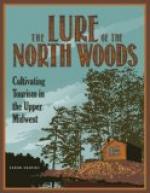“Very well,” said Mrs. Farnam. “I hate to be left alone, particularly when the nights are long.” She indicated the teamster. “I see you have hired another man; that’s a fresh extravagance. How long have you had him?”
“A week or two; thought I told you when he came. He’s a pretty good worker.”
“You didn’t tell me; I imagine you didn’t want me to know! He’s certainly not what the boys call a looker and his face doesn’t inspire me with much confidence. Besides, he’s lame.”
Agatha glanced at the man, who came towards them, walking with a slight limp beside his horses as they hauled the log across the snow. He had a sullen air and did not look up as he passed.
“He is not handsome,” she agreed, and asked: “Where do the men live?”
“We have fixed up this lot in the packing shed; my regular hands leave me in winter,” Farnam replied, indicating a wooden building at some distance from the house. “However, we’ll go home. There are some accounts I must examine before I start for Montreal.”
They went on, and when after supper Mrs. Farnam grumbled at being left without a man in the house, Farnam took out an automatic pistol and explained how it was used.
“I don’t know why I bought the thing, unless it was to satisfy Mabel,” he said to Agatha. “It’s curious, but while she could handle mutinous pupils and bluff the managers, she quakes if a door rattles on a windy night. One’s rather safer in our homestead than a Montreal hotel; but Mabel has lived in the cities and the Wild West tradition dies hard. As a matter of fact, there never was a Wild West in Canada.” He opened the pistol. “You put the cartridge shells in like this—”
“You can show Agatha how it works; I won’t touch the thing,” Mrs. Farnam declared. “She’s something of a sport, but I’m a womanly woman, except when I teach school.”
Farnam laughed. “On the whole, it might be better to leave the cartridges out. If somebody did break in, all you need do would be to pretend you were asleep. Everybody in the neighborhood knows where my office is and an intelligent burglar begins at the safe. There’s no money in mine now.”
After a little good-humored banter, Agatha took the pistol and Farnam went to his office at the other end of the house. Next day he started for Montreal, and at night Mrs. Farnam made Agatha come with her while she examined the fastenings of the doors and windows. The house was low and the roof of the veranda in front reached nearly to the second floor. Nothing disturbing happened, and on the next night Agatha sat up after Mrs. Farnam had gone to bed, reading the letters Strange had written her from the North.
There were not many, and some were marked by a careless style that obscured the meaning. This puzzled Agatha, who remembered that her father had generally talked with lucid clearness. Still they helped her to picture the life he had led in the wilds, and she read them often, trying to follow on a map his wanderings in search of the lode. They told her more about the country than the books she read, and she had read a number, because the subject had a fascination. All she could learn would be of use when she came to carry out her plans.




